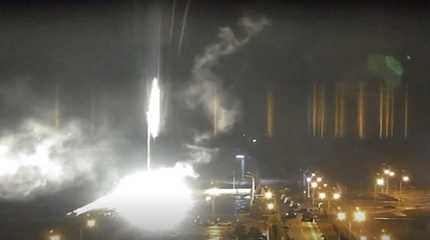
KYIV, Ukraine (AP) — Europe’s largest nuclear plant has been reconnected to Ukraine’s electricity grid, allowing engineers to shut down its last operational reactor in an attempt to avoid a radiation disaster as fighting rages in the area.
The six-reactor Zaporizhzhia Nuclear Power Plant lost its outside source of power a week ago after all its power lines were disconnected because of shelling. It was operating in “island mode” for several days, generating electricity for crucial cooling systems from its only remaining operational reactor.
That’s considered an unstable way of operating a nuclear plant, which could lead to damage to key equipment including turbines and pumps.
Nuclear operator Energoatom said one of the power lines was restored “to its operational capacity” late Saturday, making it possible to run the plant’s safety and other systems on electricity from the power system of Ukraine.
“Therefore, a decision was made to shut down power unit No. 6 and transfer it to the safest state – cold shutdown,” the company said Sunday in a statement.
Energoatom said the risk remains high that outside power is cut again, in which case the plant would have to fire up emergency diesel generators to keep the reactors cool and prevent a nuclear meltdown. The company’s chief told The Associated Press on Thursday that the plant only has diesel fuel for 10 days.
The plant, one of the 10 biggest atomic power stations in the world, has been occupied by Russian forces since early in the war, which marked its 200th day on Sunday. Ukraine and Russia have blamed each other for shelling around the plant that has damaged the power lines connecting it to the grid.
Energoatom renewed its appeal for Russian forces to leave the Zaporizhzhia plant and allow for the creation of a “demilitarized zone” around it.
The International Atomic Energy Agency, the U.N. nuclear watchdog that has two experts at the plant, confirmed that external power has been restored there.
However, IAEA Director-General Rafael Grossi said he remains “gravely concerned about the situation at the plant, which remains in danger as long as any shelling continues.”
He added that “consultations have begun on the urgent need to establish a nuclear safety and security protection zone” at the plant.
The IAEA said it would take 30 hours to bring the sixth reactor to a “cold shutdown state,” but it will still require electricity for its safety systems after that. The agency said work is under way to restore other power lines at the plant, which remains occupied by Russian forces but run by Ukrainian engineers.
Also on Sunday, French President Emmanuel Macron urged Russian President Vladimir Putin to withdraw his troops and weapons from the plant and ensure its safety and security in line with IAEA recommendations.
Macron reminded Putin in a phone conversation that the “Russian occupation of the nuclear plant was the cause for concern over its integrity,” according to a statement from the French presidency.




